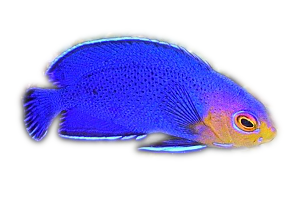
By Bob Goemans

Not Reef Tank Suitable
Likely Fish-Only Tank Suitable
Range: Indo-Pacific Ocean: Red Sea to Hawaiian, Marquesas, and Ducie Islands, north to Southern Japan, and south to western Australia and Rapa Island.
Size: 9 inches (22 cm)
Natural Environment: Inhabits lagoons, reef flats, and fore-reef slopes at depths of 3 – 200 feet (1 – 60 m) and feeds on filamentous algae, crabs, worms, crustaceans, sponges, clams, soft and stony corals, hydroids, tunicates, sea cucumber feet, anemones, and other invertebrates. Adults occur singly in pairs, or small groups.
General Husbandry: This is one of the most attractive species in this very large genus, having a silvery body with a black band covering the eyes, two differently placed slanted black lines on the body, a black eye-spot on the upper aft of the dorsal fin (Red Sea specimens lack the eye-spot) and its dorsal, anal and tail is bright yellow, as is the upper aft portion of the body. Its also by far one of the easiest to maintain since it often readily accepts a wide range of foodstuffs.
Adapts quite easily to aquarium life, even though somewhat shy when first introduced, in larger peaceful fish-only aquariums, especially those with lots of open swimming space and live rock hiding places.
This species is an excellent browser of filamentous algae, therefore flake foods, especially those containing Spirulina and/or Nori should be offered, as should a meaty diet of live fortified brine shrimp, black worms (Lumbriculus variegatus), and/or various frozen meaty foods such as mysis, and overall be offered several times daily.
Will also decimate Aiptasia anemones, yet if more suitable/preferred foods are available, that may not always occur.
Rarely is there a problem getting this species to feed in the aquarium, yet should that occur, small human consumption clams/black mussels purchased in local grocery stores and placed on the half-shell in the aquarium may help entice it to begin feeding. Over time, frozen foods like mysis and brine shrimp, and various fake foods should be more readily accepted
Taxonomy:
Order: Perciformes
Suborder: Percoidei
Family: Chaetodontidae
Genus: Chaetodon
FYI: Preferably maintained without others in the same genus or having similar coloration.
Juveniles acclimate more easily to aquarium life than do adults.
Pressing some soft foods into openings/crevices on a piece of old dead coral skeleton can sometimes encourage finicky eaters to begin feeding.
Experience Level: Beginner
Temperament: Peaceful
Diet: Omnivore
Coral Safe: No
Invertebrate Safe: No
Acclimation Time: 30 minutes+
Aquarium Environment: Fish-only aquarium
Tankmates: Peaceful or non-aggressive
Minimum Tank Size: 100 gallons
Temperature Range: 74 - 82°F (24 – 27°C)
Specific Gravity: 1.020 -1.026
pH: 8.0 - 8.5
